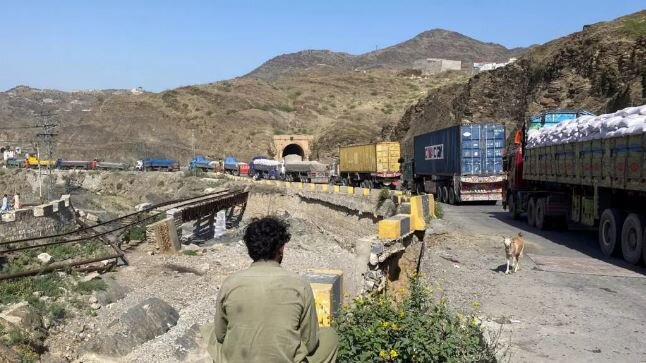Araghchi discusses Afghanistan tensions with Pakistani counterpart
Reports of dozens of casualties in border clashes

TEHRAN – Iranian Foreign Minister Abbas Araghchi and his Pakistani counterpart Muhammad Ishaq Dar held a telephone conversation to discuss major regional and international developments, underscoring the need to strengthen bilateral cooperation and expand regional engagement.
According to the Iranian Foreign Ministry, the two diplomats emphasized utilizing all available capacities in trade and transit sectors and reaffirmed the importance of enhancing both bilateral and multilateral coordination to promote stability and prosperity in the region.
They also highlighted the role of active diplomacy, information exchange, and regional coordination in advancing peace and stability across West and South Asia.
At the conclusion of the conversation, both sides welcomed the halt in the genocide in Gaza and exchanged views on potential joint efforts to support the Palestinian people and consolidate regional peace.
Iran voices concern over Pakistan-Afghanistan border clashes
The latest phone call between the Iranian and Pakistani foreign ministers came amid escalating tensions along the Pakistan-Afghanistan border, where fierce overnight clashes have reportedly erupted between the two sides.
On Saturday, Iranian Foreign Ministry spokesman Esmaeil Baqaei expressed concern over the situation, urging both Afghanistan and Pakistan to exercise restraint and respect each other’s territorial integrity and national sovereignty.
He reiterated that the Islamic Republic attaches great importance to preserving peace and stability in its surrounding region and stands ready to assist in reducing tensions between the two neighboring Muslim countries.
Kabul was shaken on Thursday by two explosions, while another blast struck a market in Afghanistan’s border province of Paktika, further inflaming tensions between Kabul and Islamabad.
The Taliban government accused Pakistan of violating Afghanistan’s sovereignty, condemning the cross-border attacks as a breach of international norms. Islamabad stopped short of denying involvement in the explosions but urged the Taliban to rein in the Pakistan Taliban (TTP), an armed group long blamed for deadly assaults inside Pakistan.
Once close allies sharing strategic interests, Pakistan and the Taliban government have seen their relations deteriorate sharply amid Islamabad’s accusations that Kabul is harboring TTP militants responsible for years of cross-border attacks. According to data from the Centre for Research and Security Studies, an Islamabad-based think tank, at least 2,414 people have been killed in violent incidents during the first three quarters of this year alone.
Reports suggest that Islamabad has accused Kabul of allowing militant groups to launch attacks from Afghan soil, while the Taliban has blamed Pakistan for conducting airstrikes inside Afghanistan. Taliban sources claimed to have seized two Pakistani border posts in Helmand Province, while Pakistani officials described “heavy exchanges” of fire at several points along the frontier.
The two neighbors share a 2,600-kilometer (1,600-mile) rugged and mountainous frontier known as the Durand Line, a boundary drawn in 1893 under British rule. The border is officially recognized by Pakistan but rejected by Afghanistan, which insists that any activity along the line requires mutual consent.
The Durand Line, which runs through the historic tribal belt dividing ethnic Pashtun communities, has remained a source of deep political tension for decades.
In February 2024, Afghan Deputy Foreign Minister Sher Mohammad Abbas Stanikzai reiterated Kabul’s stance, declaring: “We will never recognize the Durand Line. Today, half of Afghanistan is separated and lies on the other side of it.”
The Taliban government has repeatedly referred to the boundary as a “hypothetical line,” signaling that the dispute over its legitimacy continues to fuel the strained relationship between the two countries.
So far in the clashes, Pakistan claims to have killed over 200 Afghan fighters, while Afghanistan reports killing 58 Pakistani soldiers.
Given the deteriorating situation, Iran may once again offer to mediate between Afghanistan and Pakistan, similar to its earlier proposal to help facilitate dialogue between India and Pakistan following the Kashmir crisis.
In previous statements back in May, Iranian President Masoud Pezeshkian and Foreign Minister Araghchi emphasized Tehran’s principled policy of de-escalation and regional peacebuilding, particularly among neighboring Muslim countries.
Earlier this year, amid rising tensions in Kashmir, Araghchi stated that “Tehran stands ready to use its good offices in Islamabad and New Delhi to foster greater understanding at this difficult time.” President Pezeshkian likewise stressed that Iran “welcomes any effort aimed at achieving lasting peace between Pakistan and India,” underscoring that Iran’s foreign policy is anchored in dialogue, balance, and cooperation.
